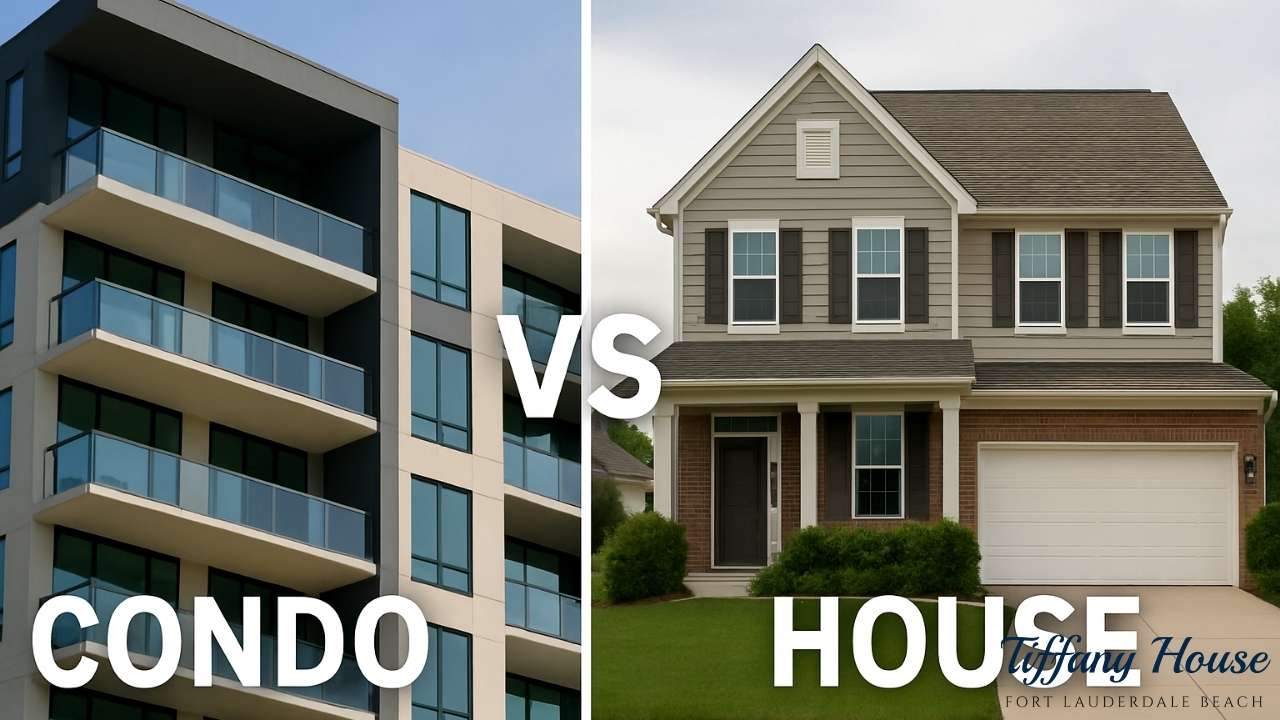Are you stuck between buying a condo or a house?
For good reason, it’s one of the most common questions among modern homebuyers. Both come with unique perks and challenges. Your decision will impact your lifestyle, financial future, and daily routine. So, how do you choose?
This guide breaks down the key differences, costs, lifestyle factors, and 2025 trends so you can make a confident and informed decision.
What’s the Difference Between a Condo and a House?
A condo (condominium) is a private unit in a larger building or community, where you own your interior space but share walls and amenities like pools, gyms, and parking with other residents.
On the other hand, a house is a stand-alone property; you own the land, the yard, the roof, and every decision.
Cost Comparison: Condo vs House
Condos:
- Lower upfront cost than houses is a significant factor for first-time buyers.
- Monthly HOA fees (ranging from $150 to $700+) cover exterior maintenance and amenities.
- Smaller property taxes due to fewer landowners.
Houses:
- Higher initial cost for purchasing and maintaining the property.
- No HOA fees (in most cases) but full responsibility for maintenance and repairs.
- Property taxes are typically higher due to land value.
According to a 2025 Redfin analysis, the median condo price in major U.S. cities is 18% lower than the median single-family home price.
Maintenance & Responsibilities
Condos are ideal for people who prefer low-maintenance living. The HOA covers roof repairs, landscaping, exterior painting, and snow removal, whereas in a house, you are responsible for all of this, but you have complete control over your property.
Lifestyle & Location
- Condos are in central, urban areas, great for walkability, nightlife, and commuting ease.
- Houses are usually found in suburban or rural areas, offering privacy, yards, and space for families or pets.
If you love city life and convenience, a condo fits the bill. But a house might be better if you want space, quiet, and long-term living.
Investment & Appreciation
Houses traditionally appreciate more over time, thanks to land ownership and higher resale demand.
However, well-located condos, especially in tourist or downtown areas, also offer good returns, especially when short-term rental income is a factor.
Pros and Cons at a Glance
| Feature | Condo | House |
|---|---|---|
| Cost | Lower entry price, monthly HOA | Higher cost, but no HOA |
| Maintenance | Low (shared via HOA) | High (owner responsibility) |
| Privacy | Moderate (shared walls/amenities) | High (private land & structure) |
| Location | Urban, central, walkable | Suburban or rural |
| Appreciation | Moderate to strong in dense markets | Generally stronger long-term growth |
FAQ’s
1. Which is more affordable in the long run?
Condos often cost less upfront but can have rising HOA fees. Houses are pricier to maintain, but offer better long-term equity and customization.
2. Do condos appreciate like houses?
Houses typically appreciate more due to land value. However, condos in high-demand urban areas can also perform well if appropriately managed.
3. Can I rent out my condo?
Yes, but it depends on the condo association’s rules. Some buildings allow short-term rentals, others don’t. Always check the bylaws first.
4. Are HOA fees worth it?
HOA fees can be worthwhile if they cover key amenities and save you from routine maintenance. Just ensure they’re stable and transparent.
5. Is a condo a good choice for first-time buyers?
Absolutely. Condos are often more budget-friendly and require less responsibility, making them ideal for singles, young couples, or downsizers.
Final Thoughts
So, should you buy a condo or a house?
- Choose a condo if you want low maintenance, urban convenience, and access to shared amenities.
- Choose a house if you value space, control, and long-term investment potential.
Looking for a Condo?
If you’re considering buying a condo, Fort Lauderdale offers unbeatable charm, beach access, and investment potential.
Tiffany House is one of the city’s top luxury condo buildings, with resort-style amenities, modern interiors, and short-term rental flexibility.

